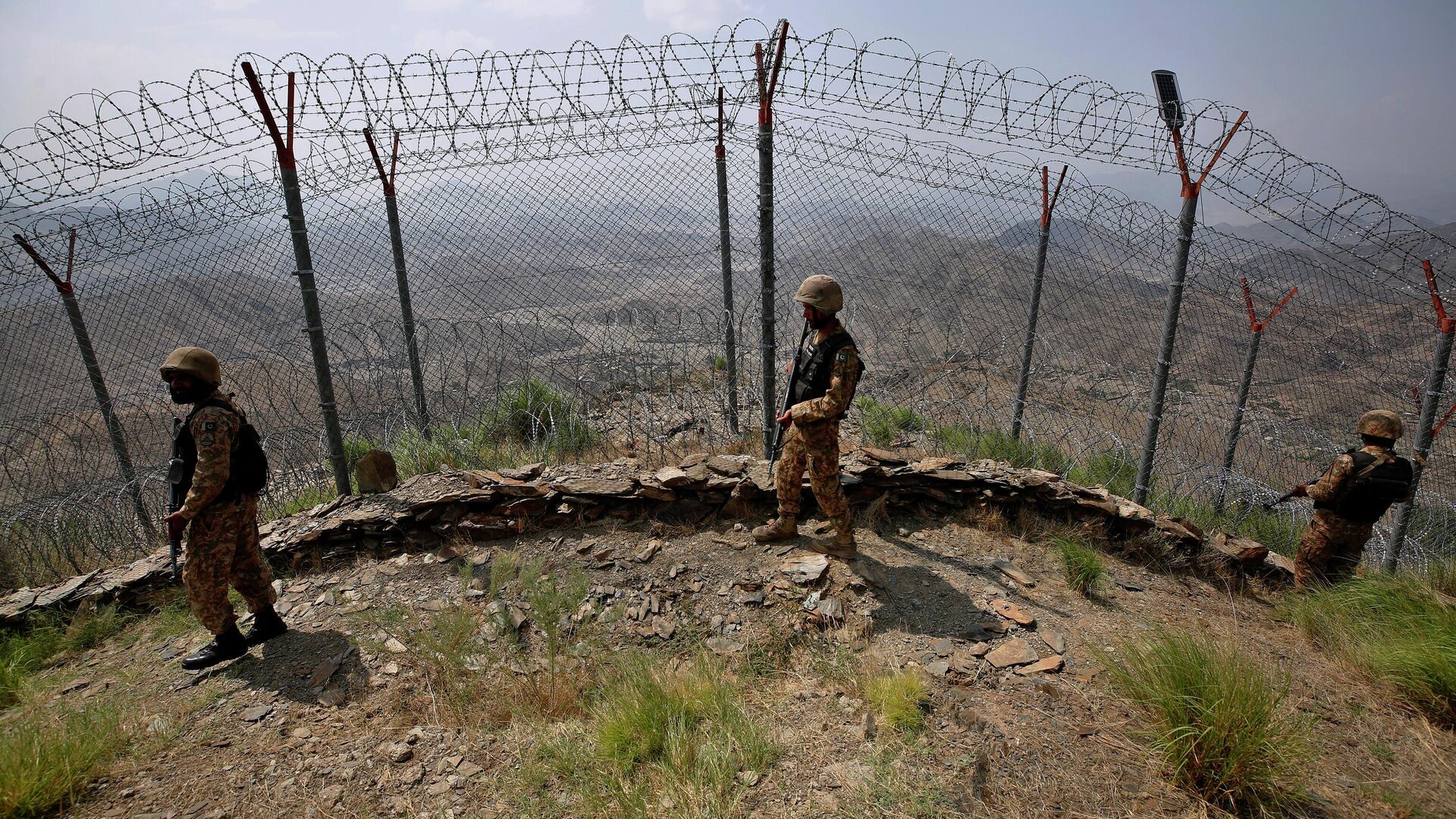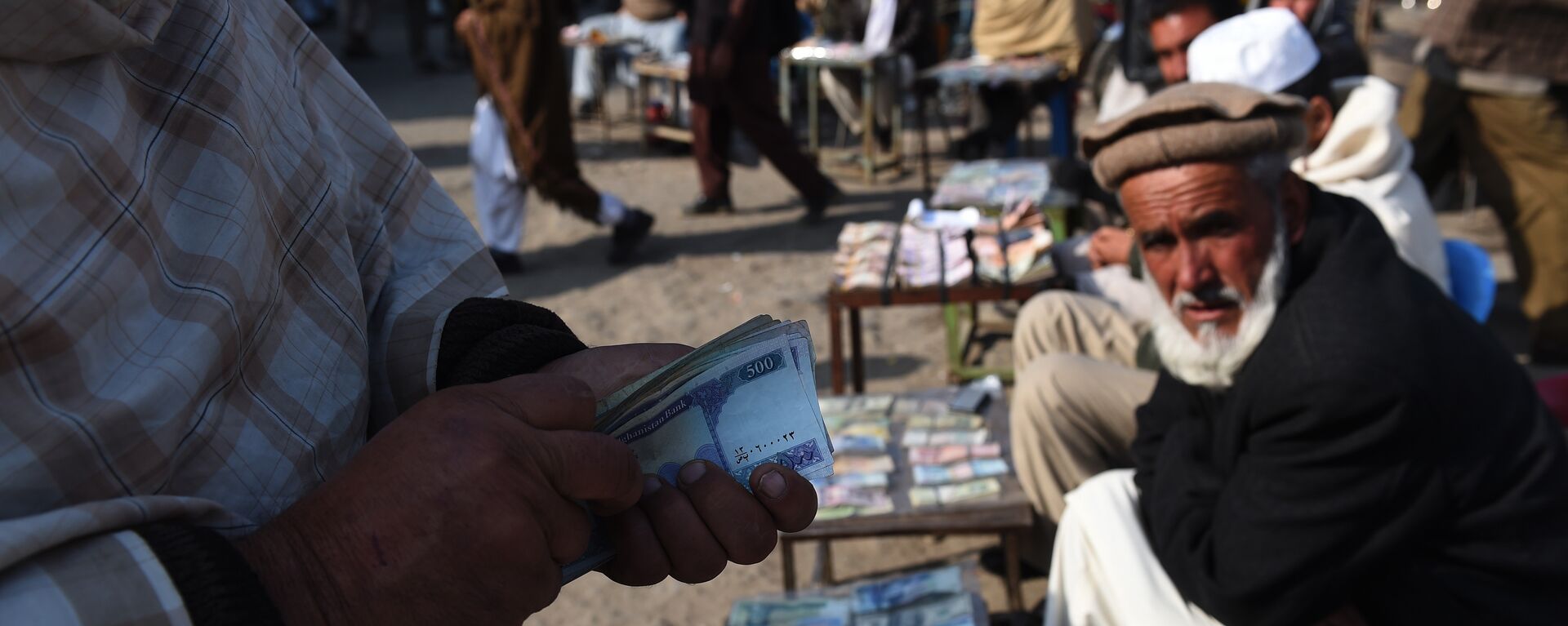https://sputnikglobe.com/20220729/china-pakistan-back-cpec-role-in-afghanistans-economic-recovery-amid-indian-objections-1097926433.html
China, Pakistan Back CPEC Role in Afghanistan’s ‘Economic Recovery’ Amid Indian Objections
China, Pakistan Back CPEC Role in Afghanistan’s ‘Economic Recovery’ Amid Indian Objections
Sputnik International
Afghanistan’s economic recovery took center stage during the SCO Foreign Ministers’ Meeting in Tashkent. Uzbekistan’s foreign minister underlined that peace... 29.07.2022, Sputnik International
2022-07-29T12:26+0000
2022-07-29T12:26+0000
2022-07-29T12:26+0000
india
china-pakistan economic corridor (cpec)
china
pakistan
taliban
afghanistan
https://cdn1.img.sputnikglobe.com/img/07e6/04/0f/1094800514_0:148:3073:1876_1920x0_80_0_0_47970b5e210c49611e8948b0f26ba213.jpg
Beijing and Islamabad say the extension of the China-Pakistan Economic Corridor (CPEC) into Afghanistan is necessary for the “economic integration” of the country. The idea was expressed as the top diplomats of member states of the Shanghai Cooperation Organization (SCO) convened for the Council of Foreign Ministers (CFM) meeting in Tashkent.CPEC, a flagship project of the Belt and Road Initiative (BRI), comprises a corridor of connectivity, mining, and infrastructure projects. It begins in China’s Xinjiang Autonomous Region and associated projects stretch to the Balochistan province in Pakistan. New Delhi has been critical of CPEC, arguing that it passes through parts of Jammu and Kashmir and Leh regions that are under the “illegal occupation” of Islamabad and Beijing.Pakistan’s Foreign Minister Bilawal Bhutto Zardari met his Chinese counterpart Wang Yi as well as the Taliban’s acting Foreign Minister Amir Khan Muttaqi on the sidelines of the SCO conference on Thursday. Wang also held a bilateral meeting with Muttaqi, the Chinese Foreign Ministry said in a statement on Friday.According to an official release by Pakistan’s Foreign Office (FO), Bhutto told Wang that CPEC’s development had reached a “new phase” with an emphasis on agriculture, science, and technology rather than just connectivity.Muttaqi, on his part, said that Pakistan should consider “expanding trade” with other Central Asian neighbors through Afghanistan. Pakistan shares the longest border with Afghanistan among all the neighboring countries.The Chinese envoy also said Beijing would exempt duties on around 98 percent of Afghanistan’s exports to China as a means to further its regional economic integration, besides resuming the process of allocating visas for incoming travelers from Afghanistan from August 1.Muttaqi didn’t participate in the main SCO Foreign Ministerial meeting on Friday.India Doubles Down on Concerns About CPECThe Indian government on Thursday, meanwhile, doubled down on its concerns about expanding CPEC into third countries, saying that no “third country” should be involved in the connectivity initiative.He refused to spell out what action New Delhi would take if a third country gets “involved” in CPEC, which is currently a bilateral project.Earlier this week, Bagchi said that the participation of a third country in CPEC would “directly infringe on India's sovereignty and territorial integrity.”The terse response came after the third meeting of the China-Pakistan Economic Corridor Joint Working Group on International Cooperation and Coordination (JWG-ICC) on July 23. Beijing and Islamabad agreed during the meeting that extending CPEC into Afghanistan would strengthen “regional connectivity.”According to Indian media reports, Foreign Minister S. Jaishankar, representing New Delhi at the SCO meeting, is also scheduled to hold a bilateral meeting with Muttaqi on the sidelines of the event.
https://sputnikglobe.com/20220726/india-must-back-push-to-unblock-afghanistans-frozen-funds-despite-trust-deficit-says-analyst-1097826759.html
china
pakistan
afghanistan
Sputnik International
feedback@sputniknews.com
+74956456601
MIA „Rossiya Segodnya“
2022
News
en_EN
Sputnik International
feedback@sputniknews.com
+74956456601
MIA „Rossiya Segodnya“
Sputnik International
feedback@sputniknews.com
+74956456601
MIA „Rossiya Segodnya“
india, china-pakistan economic corridor (cpec), china, pakistan, taliban, afghanistan
india, china-pakistan economic corridor (cpec), china, pakistan, taliban, afghanistan
China, Pakistan Back CPEC Role in Afghanistan’s ‘Economic Recovery’ Amid Indian Objections
Afghanistan’s economic recovery took center stage during the SCO Foreign Ministers’ Meeting in Tashkent. Uzbekistan’s foreign minister underlined that peace and stability in Afghanistan remains a “strategic condition” for peace in all SCO states, including Central Asian countries, China, Russia, India, and Pakistan.
Beijing and Islamabad say the extension of the China-Pakistan Economic Corridor (CPEC) into Afghanistan is necessary for the “economic integration” of the country.
The idea was expressed as the top diplomats of member states of the Shanghai Cooperation Organization (SCO) convened for the Council of Foreign Ministers (CFM) meeting in Tashkent.
CPEC, a
flagship project of the Belt and Road Initiative (BRI), comprises a corridor of connectivity, mining, and infrastructure projects. It begins in China’s Xinjiang Autonomous Region and associated projects stretch to the Balochistan province in Pakistan. New Delhi has been critical of CPEC, arguing that it passes through parts of Jammu and Kashmir and Leh regions that are under the “illegal occupation” of Islamabad and Beijing.
Pakistan’s Foreign Minister Bilawal Bhutto Zardari met his Chinese counterpart Wang Yi as well as the Taliban’s acting Foreign Minister Amir Khan Muttaqi on the sidelines of the SCO conference on Thursday. Wang also held a bilateral meeting with Muttaqi, the Chinese Foreign Ministry said in a statement on Friday.
According to an official release by Pakistan’s Foreign Office (FO), Bhutto told Wang that CPEC’s development had reached a “new phase” with an emphasis on agriculture, science, and technology rather than just connectivity.
During the meeting between Bhutto and the Taliban’s acting foreign minister, the Pakistani side underlined the need for “enhanced cooperation” among the regional countries to boost Afghanistan’s “economic integration” and “regional connectivity,” as he pointed towards the role of various connectivity and infrastructure projects in the pipeline.
Muttaqi, on his part, said that Pakistan should consider “expanding trade” with other Central Asian neighbors through Afghanistan.
Pakistan shares the longest border with Afghanistan among all the neighboring countries.
Meanwhile, a Chinese Foreign Ministry statement cited in state media quoted Wang as telling Muttaqi that Beijing was supportive of extending CPEC into Afghanistan.
The Chinese envoy also said Beijing would exempt duties on around 98 percent of Afghanistan’s exports to China as a means to further its regional economic integration, besides resuming the process of allocating visas for incoming travelers from Afghanistan from August 1.
A statement from the Taliban said that “economic reconstruction” of Afghanistan was the main focus during the bilateral meetings that Muttaqi held on the sidelines of the event.
Muttaqi didn’t participate in the main SCO Foreign Ministerial meeting on Friday.
India Doubles Down on Concerns About CPEC
The Indian government on Thursday, meanwhile, doubled down on its concerns about expanding CPEC into third countries, saying that no “third country” should be involved in the connectivity initiative.
“We are giving this warning in advance because it is a matter of our sovereignty,” Indian Foreign Ministry spokesperson Arindam Bagchi said at the weekly briefing.
He refused to spell out what action New Delhi would take if a third country gets “involved” in CPEC, which is currently a bilateral project.
Earlier this week, Bagchi said that the participation of a third country in CPEC would “
directly infringe on India's sovereignty and territorial integrity.”
The terse response came after the third meeting of the China-Pakistan Economic Corridor Joint Working Group on International Cooperation and Coordination (JWG-ICC) on July 23.
Beijing and Islamabad agreed during the meeting that extending CPEC into Afghanistan would strengthen “regional connectivity.”
According to Indian media reports, Foreign Minister S. Jaishankar, representing New Delhi at the SCO meeting, is also scheduled to hold a bilateral meeting with Muttaqi on the sidelines of the event.


